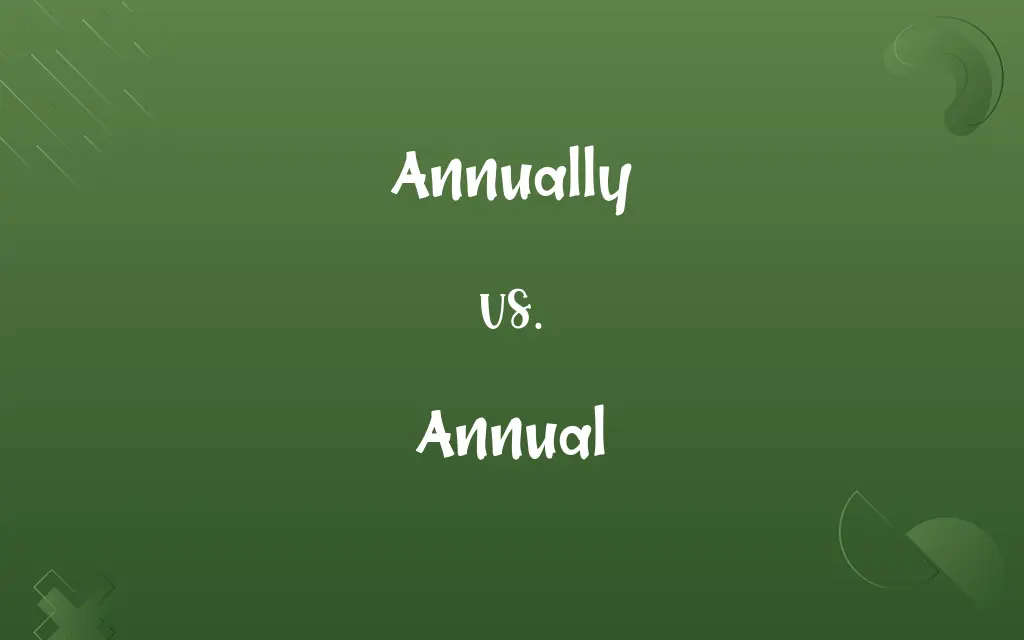Annually vs. Annual: Know the Difference

By Dua Fatima & Shumaila Saeed || Updated on March 4, 2024
Annually refers to something happening once every year, whereas annual is an adjective describing events or items that occur or are used once a year.

Key Differences
Annually is an adverb that specifically indicates the frequency with which an event or action occurs, namely once every year. It is often used to describe recurring events, payments, or activities that take place or are conducted once a year. Annual, on the other hand, serves as an adjective that modifies nouns to describe things that happen once a year, such as annual meetings, annual reports, or annual plants, emphasizing their yearly nature.
Shumaila Saeed
Mar 04, 2024
When discussing financial terms, companies might release an annual report, which is a comprehensive statement of the company's yearly performance. Here, "annual" modifies "report," indicating it's a yearly publication. Conversely, a company might say it pays dividends annually, using "annually" to describe the frequency of the dividend payments.
Dua Fatima
Mar 04, 2024
You might attend an annual conference, where "annual" describes the conference that occurs once a year. If you participate in this conference yearly, you might say you attend it annually, using "annually" to convey the regularity of your attendance.
Dua Fatima
Mar 04, 2024
Regarding plant biology, the term "annual" is used to classify plants that complete their lifecycle in a single year, from germination to seed production. There's no equivalent usage of "annually" in this context, as "annual" specifically describes the type of plant based on its lifecycle duration.
Hifza Nasir
Mar 04, 2024
"Annual" is used as an adjective to describe something that pertains to a yearly occurrence, while "annually" is an adverb that details how often an event or action happens. The main difference lies in their grammatical roles and the slight nuance in their application, with "annual" modifying nouns and "annually" modifying verbs or entire sentences to indicate frequency.
Hifza Nasir
Mar 04, 2024
ADVERTISEMENT
Comparison Chart
Usage Example
"The organization holds its elections annually."
"The annual meeting is scheduled for May."
Dua Fatima
Mar 04, 2024
Key Difference
Indicates how often something happens
Describes something that happens once a year
Shumaila Saeed
Mar 04, 2024
ADVERTISEMENT
Annually and Annual Definitions
Annual
Occurring once each year.
The annual report outlines the company's performance.
Shumaila Saeed
Mar 04, 2024
Annual
Describing events happening yearly.
The annual conference attracts industry leaders.
Dua Fatima
Mar 04, 2024
Annually
Used to describe the regularity of an event.
Interest is calculated annually.
Dua Fatima
Mar 04, 2024
ADVERTISEMENT
Annual
Associated with an anniversary or similar yearly celebration.
The annual gala is a major fundraising event.
Shumaila Saeed
Mar 04, 2024
Annual
Referring to yearly publications.
The journal publishes an annual edition.
Dua Fatima
Mar 04, 2024
Annually
Emphasizing yearly occurrences.
The festival is celebrated annually on the first weekend of June.
Shumaila Saeed
Mar 04, 2024
Annual
Pertaining to something that lasts for one year.
Annual plants die after one season.
Dua Fatima
Mar 04, 2024
Annual
Recurring, done, or performed every year; yearly
An annual medical examination.
Dua Fatima
Oct 19, 2023
Repeatedly Asked Queries
Can "annually" and "annual" be used interchangeably?
No, because "annually" is an adverb describing the frequency of an occurrence, while "annual" is an adjective describing the nature of an event or item.
Dua Fatima
Mar 04, 2024
What does annual mean?
Annual is an adjective describing something that happens once a year or is intended for use over a year.
Dua Fatima
Mar 04, 2024
Is "annual" only used for events?
No, "annual" can describe anything that occurs once a year, including reports, plants, and subscriptions.
Dua Fatima
Mar 04, 2024
How do I know whether to use "annually" or "annual"?
Use "annually" if you're describing how often something happens (adverb). Use "annual" if you're describing the yearly nature of an event or item (adjective).
Shumaila Saeed
Mar 04, 2024
Can "annual" describe plants?
Yes, "annual" describes plants that complete their lifecycle in one year.
Dua Fatima
Mar 04, 2024
Can "annual" be used to describe financial terms?
Yes, it's often used to describe reports, meetings, and other financial terms that occur or are relevant once a year.
Hifza Nasir
Mar 04, 2024
Is "annually" only related to calendar years?
While it typically refers to calendar years, it can also apply to any regular yearly cycle.
Dua Fatima
Mar 04, 2024
What's an example of "annual" in a sentence?
"The annual festival is the highlight of our community events."
Shumaila Saeed
Mar 04, 2024
What does annually mean?
Annually means occurring once every year or every year.
Shumaila Saeed
Mar 04, 2024
Is there a situation where "annually" is preferred over "annual"?
Yes, when emphasizing the frequency of an occurrence, "annually" is preferred.
Dua Fatima
Mar 04, 2024
How do "annually" and "annual" compare in financial contexts?
"Annual" describes the type of financial report or meeting, while "annually" might describe the frequency of payments or assessments.
Dua Fatima
Mar 04, 2024
Does "annually" have a specific time frame?
Yes, it specifically refers to a once-a-year time frame.
Hifza Nasir
Mar 04, 2024
What's an example of "annually" in a sentence?
"The membership fee is paid annually."
Dua Fatima
Mar 04, 2024
Can "annual" modify a person?
No, "annual" modifies objects, events, or occurrences, not people.
Shumaila Saeed
Mar 04, 2024
Can "annual" be used to describe more than events?
Absolutely, it can describe anything with a yearly occurrence or duration, including publications and plants.
Dua Fatima
Mar 04, 2024
Share this page
Link for your blog / website
HTML
Link to share via messenger
About Author
Written by
Dua FatimaCo-written by
Shumaila SaeedShumaila Saeed, an expert content creator with 6 years of experience, specializes in distilling complex topics into easily digestible comparisons, shining a light on the nuances that both inform and educate readers with clarity and accuracy.









































































